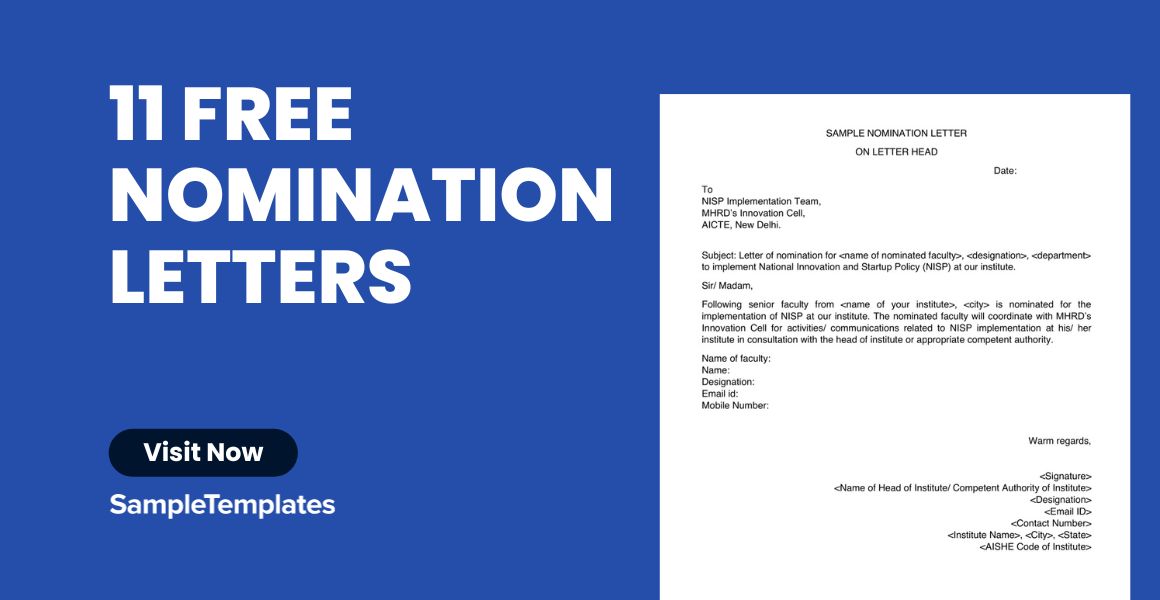Crafting an effective nomination letter is crucial for endorsing a deserving individual for an award, a leadership position, or any prestigious recognition. Our Sample Nomination Letter Template simplifies this process, offering a well-structured and customizable letter format. With clear guidance on how to highlight the nominee’s achievements, strengths, and qualifications, this template is your go-to resource for creating a compelling nomination. Ideal for various contexts, including corporate awards, educational accolades, or community honors, this template ensures your nomination stands out. Dive into this guide to master the art of nomination writing and make a significant impact with your endorsement.
1. Sample Nomination Letter Template
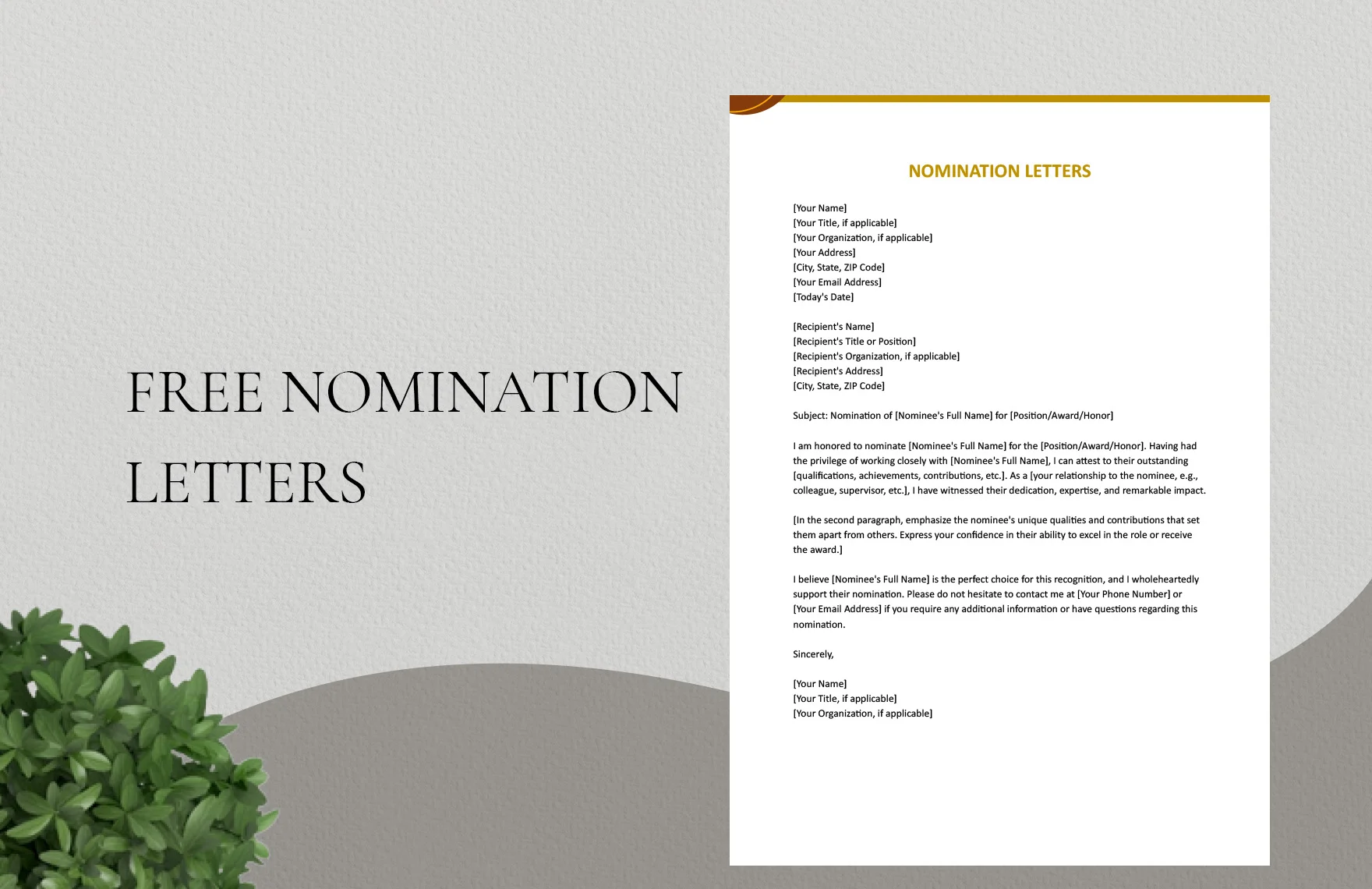
2. Auditor Nomination Letter Template
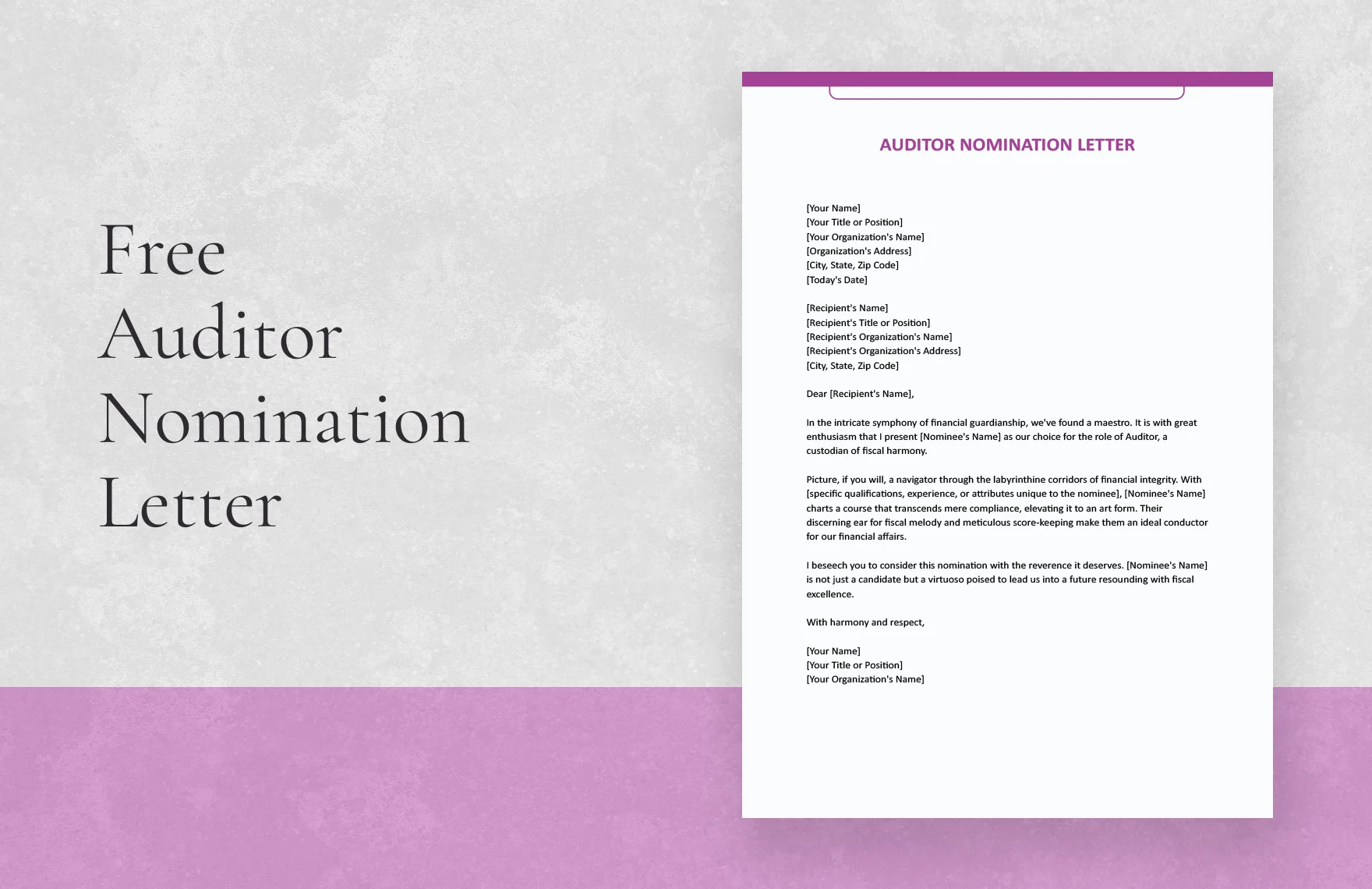
3. Sample Award Nomination Letter
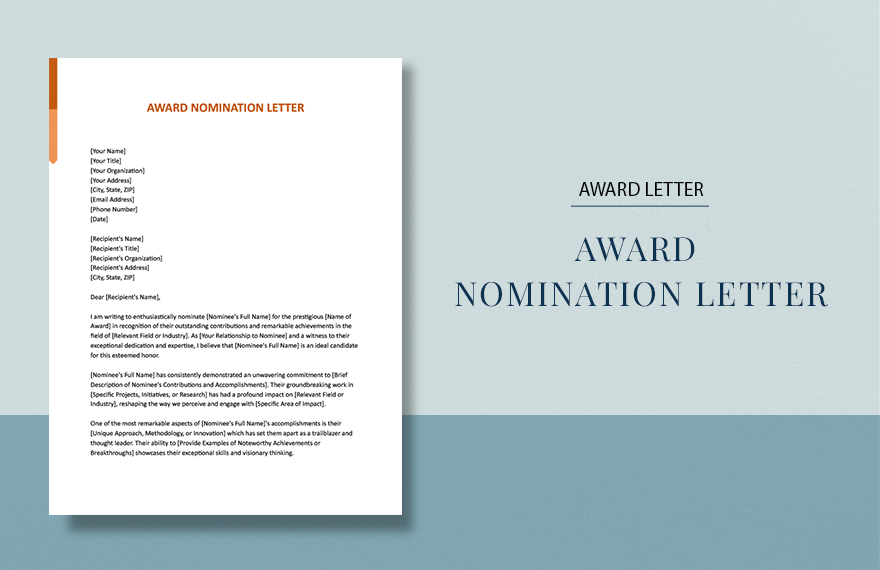
What is a nomination letter?
A nomination letter is a formal document used to recommend an individual for a specific award, position, recognition, or opportunity. This letter plays a crucial role in highlighting the nominee’s qualifications, achievements, and suitability for the honor or position they are being considered for. The essence of a nomination letter lies in its ability to persuasively convey the nominee’s merits, making a compelling case for why they stand out as the best candidate.
Typically, nomination letters are written by someone who knows the nominee well and can speak authoritatively about their capabilities and accomplishments. This could be a colleague, supervisor, mentor, or a professional peer. The letter often begins by stating the purpose of the nomination, followed by a detailed account of the nominee’s relevant skills, experiences, and contributions. It’s important to provide specific examples and anecdotes to substantiate the claims made in the letter, as this adds credibility and depth to the nomination.
In addition to outlining the nominee’s achievements, a good nomination letter also sheds light on their personal qualities, such as leadership skills, dedication, creativity, or community involvement. These traits often play a significant role in decision-making processes, especially for awards or positions that value character and personal integrity as much as professional accomplishments.
The tone of a nomination letter should be professional yet enthusiastic, conveying a genuine belief in the nominee’s worthiness. It’s also essential to adhere to any specific guidelines or criteria set by the awarding body or organization, ensuring that the nomination aligns with what they are looking for in a candidate.
A well-written nomination letter not only benefits the nominee but also reflects positively on the writer, showcasing their ability to recognize and advocate for talent. It is an instrumental tool in bringing deserving individuals into the spotlight, giving them the opportunity to gain recognition and further their personal and professional goals.
4. Reject Nomination Letter Template
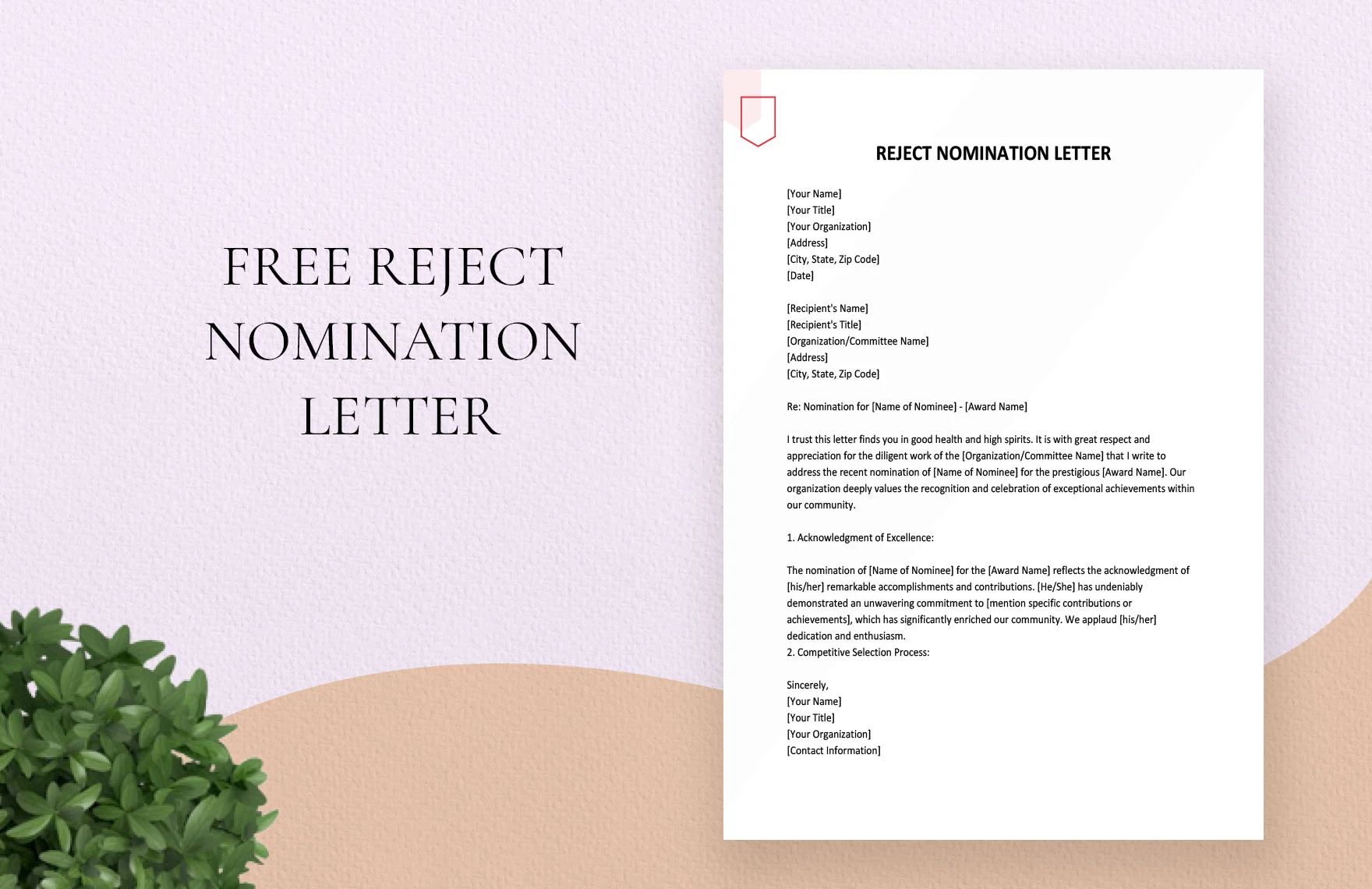
5. Sample Employee of The Year Nomination Letter
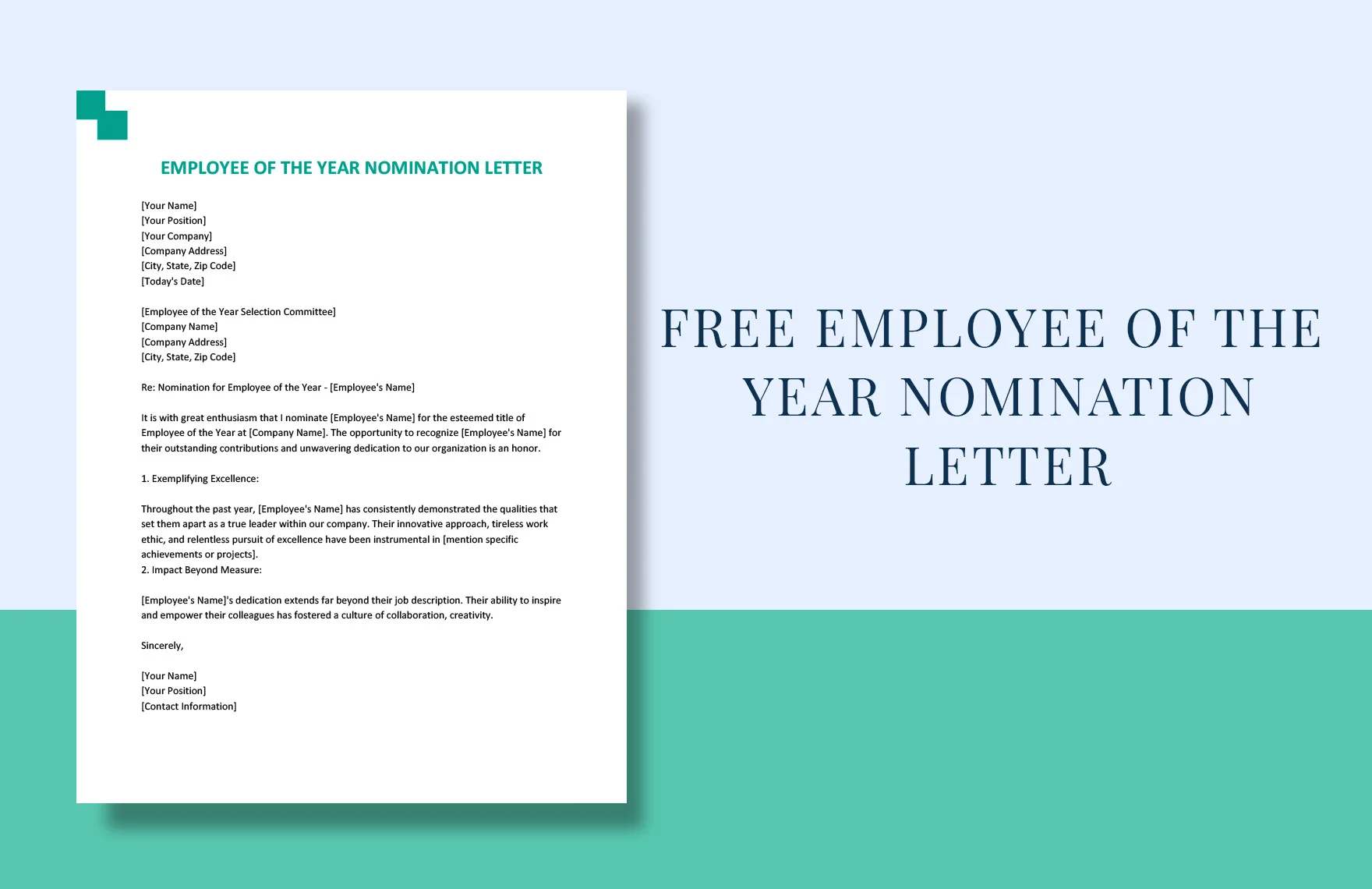
Reasons to write a nomination letter
Writing a nomination letter is a significant act that serves multiple purposes, both for the nominee and the nominator. These letters are essential in various settings, from professional to academic and community-based contexts. Here are several compelling reasons to write a nomination letter:
Recognition of Excellence: Nomination letters are a formal way to acknowledge and celebrate someone’s outstanding achievements or contributions. They highlight the nominee’s exceptional work, whether it’s in a professional, academic, or volunteer capacity, bringing deserved recognition to their efforts.
Career Advancement: For professionals, a nomination letter can be a stepping stone to career advancement. Being nominated for awards, positions, or special projects can enhance a professional’s resume, opening doors to new opportunities and career growth.
Boosting Morale and Motivation: Receiving a nomination can significantly boost the morale of the nominee. It serves as a powerful affirmation of their hard work and can be a motivating factor, encouraging them to continue striving for excellence.
Enhancing Visibility: Nomination letters increase the visibility of talented individuals within an organization or industry. This heightened visibility can lead to more opportunities for networking, collaborations, and professional development.
Fostering a Positive Environment: In organizational settings, nominating someone for an award or recognition fosters a positive environment. It shows that excellence is noticed and rewarded, which can encourage a culture of high performance and mutual appreciation.
Strengthening Relationships: Writing a nomination letter can strengthen the relationship between the nominator and the nominee. It demonstrates respect and admiration, building a sense of camaraderie and mutual support.
Encouraging Continuous Improvement: Nomination letters often outline specific achievements and strengths, providing nominees with clear insights into what aspects of their work are most valued. This can guide their future efforts and encourage continuous improvement.
Contributing to Personal Development: For the nominee, being recognized can play a significant role in their personal development. It can boost their confidence and self-esteem, reinforcing their sense of purpose and commitment to their field or community.
Highlighting Role Models: Nomination letters bring attention to role models in various fields. They help in setting benchmarks for excellence and inspire others to emulate the qualities and achievements of the nominees.
Promoting Diversity and Inclusion: By nominating individuals from diverse backgrounds, nomination letters can play a role in promoting diversity and inclusion. Recognizing the achievements of people from various demographics encourages a more inclusive and representative environment.
In summary, writing a nomination letter is a powerful tool for recognizing and promoting excellence. It not only honors the individual achievements of the nominee but also contributes positively to the broader community, organization, or industry by highlighting exemplary models of success and dedication.
6. New Member Nomination Letter Template
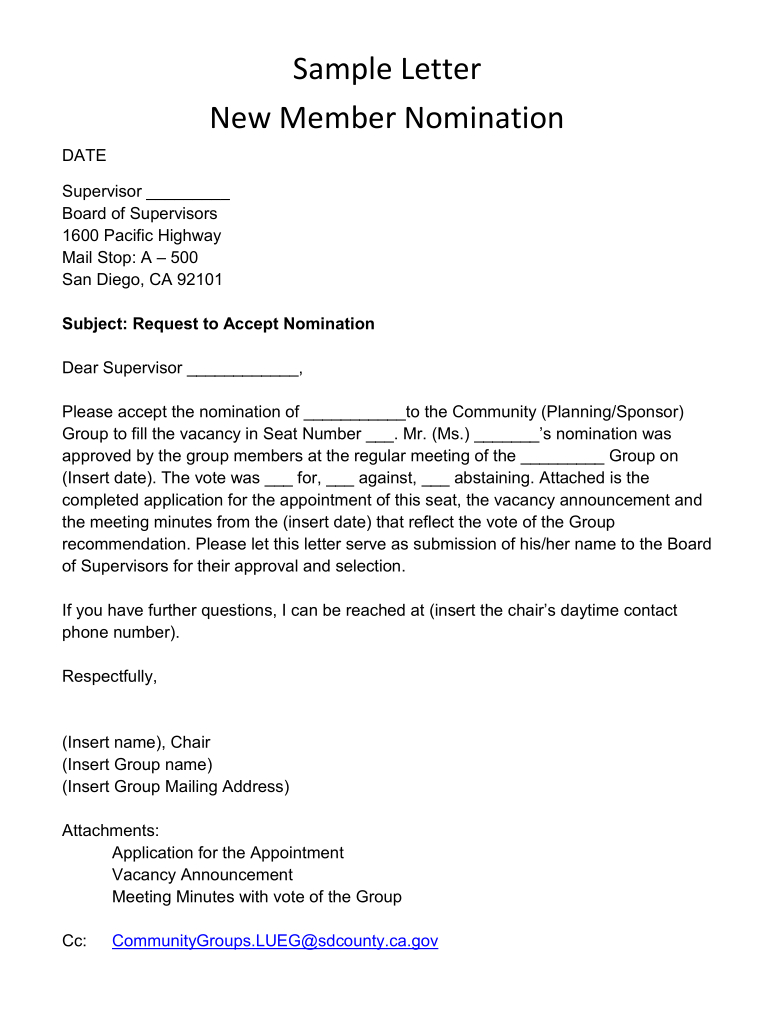
7. Institute Nomination Letter Template
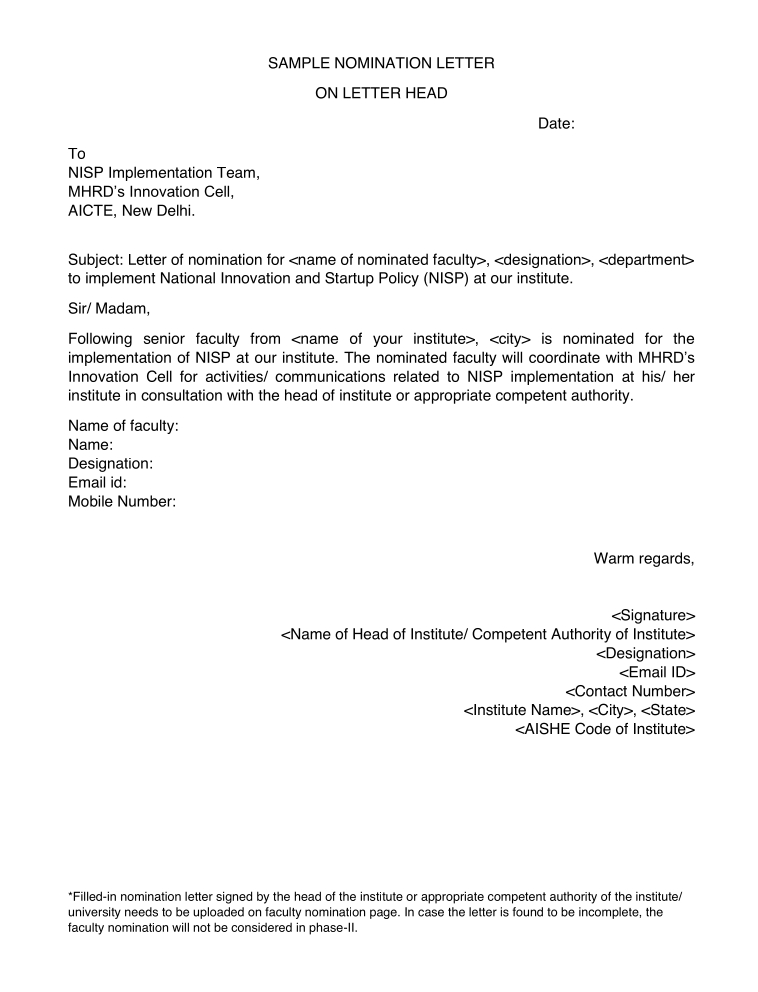
8. Sample Letter of Notification for Nomination
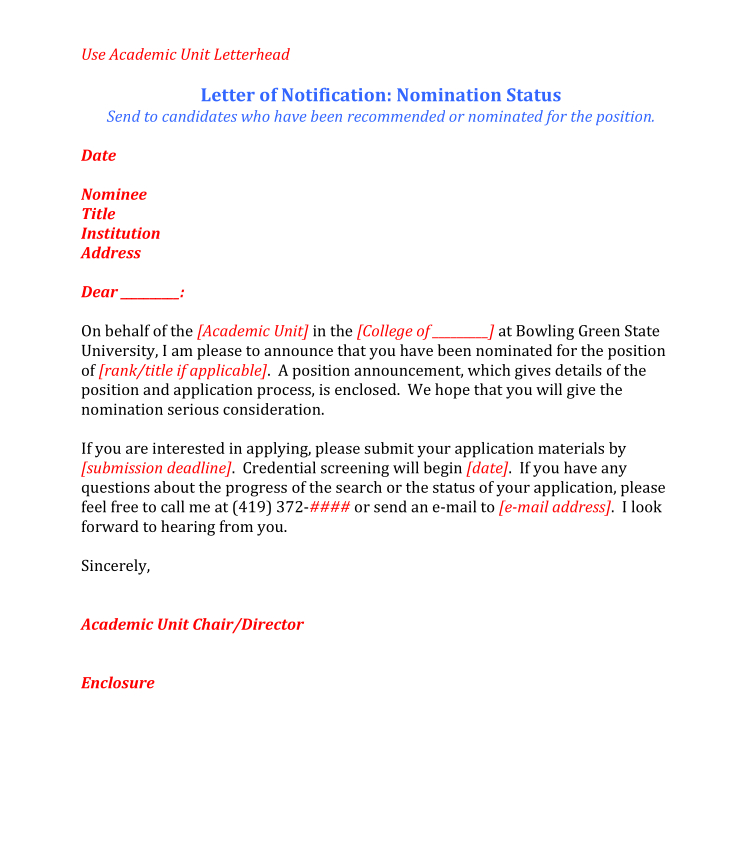
9. Sample Nomination Writeup Leter
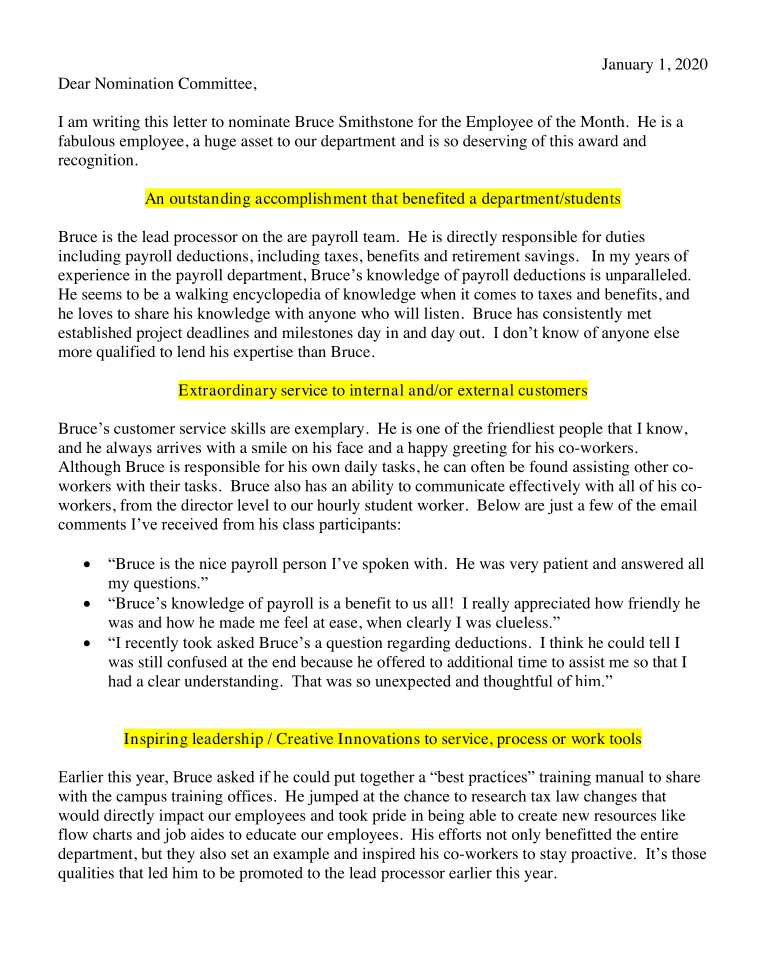
How to write a nomination letter?
Writing an effective nomination letter is a thoughtful process that involves articulating the merits and achievements of the nominee in a persuasive and organized manner. Here is a guide on how to craft a compelling nomination letter:
1. Start with a Clear Introduction:
Begin your letter with a clear statement of purpose. Mention who you are nominating and for what award or position. This sets the tone and context for the rest of the letter. It’s also helpful to briefly introduce yourself and explain your relationship to the nominee to establish your credibility.
2. Provide Background Information:
Give a brief background of the nominee. This includes their current position, relevant past experiences, and any key qualifications that make them a strong candidate for the nomination. This section should lay the foundation for why they are being considered.
3. Highlight Achievements and Qualifications:
Detail the specific achievements, skills, and qualifications of the nominee that make them ideal for the honor or position. Use concrete examples and anecdotes to illustrate their accomplishments. This could include successful projects, leadership experiences, awards, or any other relevant accolades. Make sure these examples align with the criteria of the award or position.
4. Discuss the Nominee’s Impact:
Explain how the nominee has made a significant impact in their field, community, or organization. Discuss how their work has contributed to the betterment of others or led to positive changes. This could be through innovation, leadership, community service, or other avenues.
5. Personal Qualities and Characteristics:
Include a section on the personal qualities of the nominee that make them stand out. Attributes like dedication, integrity, creativity, and the ability to work well with others are often important considerations for awards and recognitions.
6. Conclude with a Strong Endorsement:
Conclude your letter with a strong statement of endorsement. Reiterate why you believe the nominee is the best fit for the award or position and express your enthusiastic support for their nomination.
7. Keep It Professional and Concise:
Ensure that the tone of the letter is professional and the content is concise. While it’s important to be thorough, keep the letter focused and to the point. Avoid overly flowery language or excessive length.
8. Proofread and Edit:
Finally, proofread your letter for any spelling or grammatical errors. A well-written, error-free letter not only reflects well on you as the nominator but also on the nominee.
A well-crafted nomination letter not only highlights the achievements and qualities of the nominee but also serves as a testament to their impact and potential. It should be engaging, persuasive, and clearly align with the criteria of the award or position for which they are being nominated.
10. Sample Nomination Letter to Committee
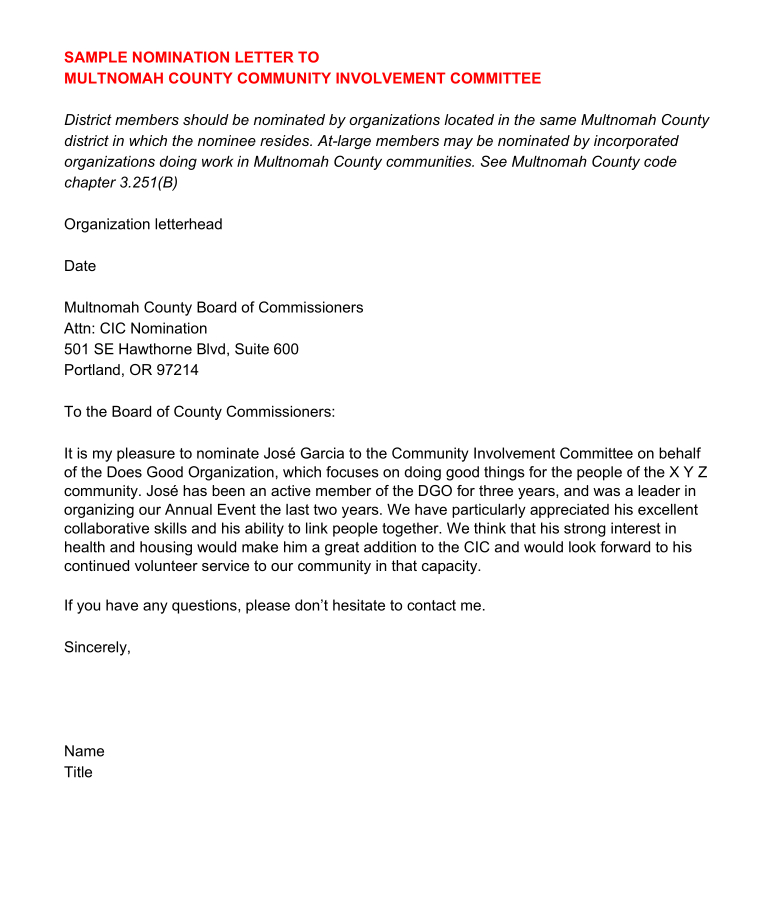
11. Self Nomination Letter Template
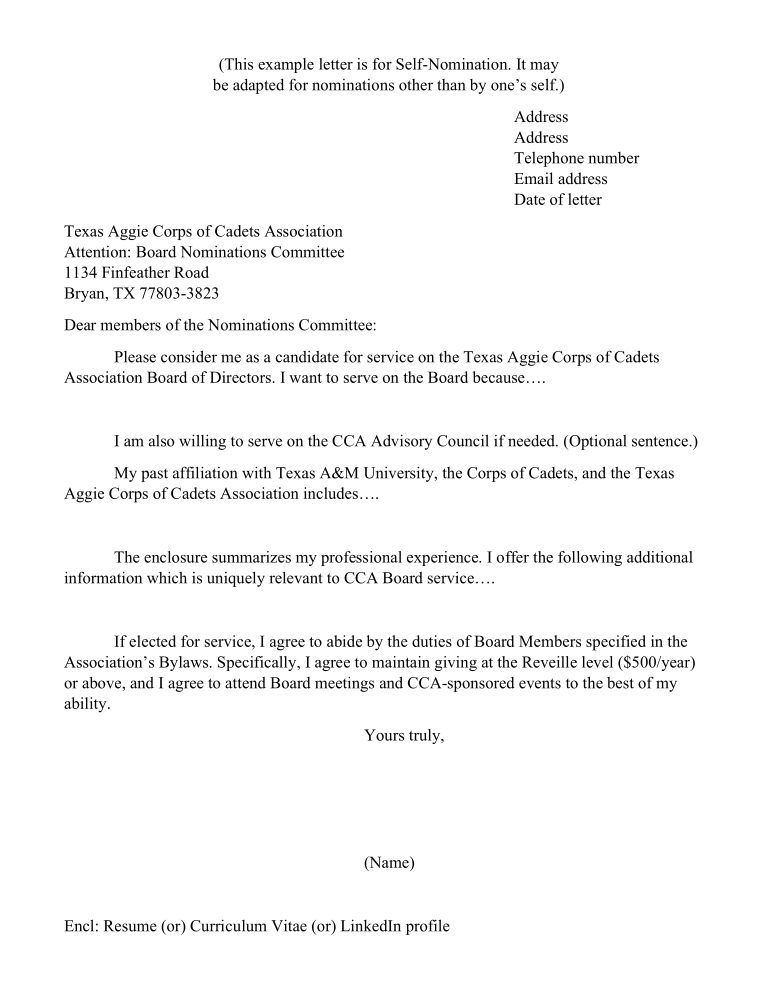
Who Can Write a Nomination Letter?
Typically, nomination letters are written by someone who knows the nominee well and can vouch for their abilities and achievements. This could be a colleague, supervisor, mentor, teacher, or a professional peer.
A nomination letter should include a clear introduction, background information about the nominee, detailed examples of their achievements, an explanation of their impact, and a strong endorsement statement. Personal attributes and professional skills relevant to the nomination should also be highlighted.What Should Be Included in a Nomination Letter?
The length of a nomination letter can vary, but it is generally recommended to keep it concise and to the point, typically no more than one or two pages.How Long Should a Nomination Letter Be?
An effective nomination letter is well-organized, provides specific examples and achievements of the nominee, and clearly aligns with the criteria of the award or position. A professional tone and a strong personal endorsement are also key.What Makes a Nomination Letter Effective?
A nomination letter should be formatted like a formal business letter, with the nominator’s contact information, the date, the recipient’s information, a formal salutation, the body of the letter, and a formal closing.How Do I Format a Nomination Letter?
Submission guidelines vary depending on the organization or award. It’s important to follow the specific instructions provided, which may include email, an online submission form, or postal mail.How Do I Submit a Nomination Letter?
In summary, crafting a nomination letter is an impactful way to honor and support an individual’s exceptional accomplishments and contributions. This formal document is a critical endorsement, highlighting the nominee’s qualifications and aligning with the award or position’s requirements. An effective nomination letter not only brings recognition to the nominee but also promotes a positive culture of recognition and success within any organization or community.
Related Posts
Rental Agreement Letter
Cover Letter
Family Reference Letter Samples & Templates
Teaching Resignation Letter Samples & Templates
Teacher Letter of Recommendation Samples & Templates
Payment Letter Formats Samples & Templates
Business Proposal Letter to Client Samples & Templates
Company Introduction Letter Samples & Templates
Resignation Letter for Medical Samples & Templates
Letter of Intent Samples & Templates
Letter of Intent for a Job Samples & Templates
Lease Proposal Letter Samples & Templates
Letter of Inquiry Samples & Templates
Character Reference Letter Samples & Templates
Claims Letter Samples & Templates
